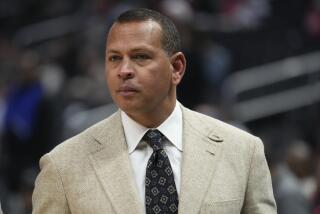Doping Scandal Breaks Open
- Share via
NEW YORK — The founder of a Bay Area nutritional supplement lab said he provided a wide variety of steroids and other banned substances to Marion Jones, calling the multiple Olympic gold medalist a drug cheat, according to an interview transcript released Thursday.
Jones’ attorney denied the accusations leveled by Victor Conte, who spoke to ABC News in an interview set to air tonight on “20/20.”
“Mr. Conte’s statements have been wildly contradictory, while Marion Jones has steadfastly maintained her position throughout: She has never, ever used performance-enhancing drugs,” attorney Richard M. Nichols said in a statement. “Mr. Conte is simply not credible.”
Conte and three other men associated with the Bay Area Laboratory Co-Operative, known as BALCO, have pleaded not guilty to federal steroid distribution charges and are awaiting trial.
Late Thursday night, the San Francisco Chronicle reported on its website that San Francisco Giant slugger Barry Bonds told a grand jury last year he used two banned substances given to him by his personal trainer -- one of the BALCO defendants -- but that he did not think they were steroids.
The Bonds report capped a day of striking developments in the doping scandal. Reports emerged about extensive use of steroids by two other former clients of the BALCO lab: New York Yankee star Jason Giambi reportedly told a grand jury that he injected himself with steroids for several years, and Kelli White, a former world sprint champion, said she used a wide assortment of banned substances that caused unwelcome changes to her body.
Giambi, the American League’s most valuable player in 2000, spoke about his steroid use during secret testimony last December, according to an account published Thursday in the San Francisco Chronicle. He reportedly said he obtained the steroids from Greg Anderson, who is a defendant in the steroid distribution case as well as the personal trainer for Bonds.
Testimony attributed to Giambi is the first public report of an admission of willful use of steroids by a major leaguer linked to BALCO.
Bonds’ testimony remains sealed. However, according to the Chronicle report, Bonds told the grand jury in December that he had been told the clear and cream substances he used in 2003 were the nutritional supplement flaxseed oil and an arthritis balm. Bonds’ attorney, Michael Rains, told the Chronicle the leak of sealed testimony was an attempt to smear Bonds, the game’s single-season home-run king who, with 703 career home runs, is closing in on Hank Aaron’s career mark.
A call placed Thursday night by The Times to Rains’ office was not returned.
White, winner of the 100- and 200-meter dashes at the 2003 U.S. and world championships, said the culture of doping in sports is so pervasive that she felt compelled to cheat to have any chance of winning.
“I have no clue what it’s going to take to change that,” she said.
In a tearful interview in New York with the Los Angeles Times, USA Today and the Chronicle, White said she obtained steroids and other substances from Conte. She said she used so many substances that she developed acne, her voice became raspy and she menstruated for a week every other week for two months -- a condition remedied only when Conte lowered her dosage of the potent designer steroid THG.
She was banned in May from competition for two years after acknowledging she used banned substances. She had tested positive in August 2003 for modafinil, a prescription stimulant. At the time, she said she took the substance to help her combat narcolepsy. She admitted Thursday that the sleeping disorder explanation was “a story Victor told me to use.”
Taken together, the admissions and accusations signaled a new wave of fallout from the far-reaching scandal, which has cast a cloud over baseball and track and field since Conte, Anderson, BALCO executive James Valente and track coach Remi Korchemny were indicted in San Francisco federal court 10 months ago. In court hearings Wednesday, U.S. District Judge Susan Illston indicated a trial might occur in the spring.
The investigation arose when an anonymous track coach, since identified as Raleigh, N.C.-based Trevor Graham, sent a syringe of THG to the U.S. Anti-Doping Agency. The case gained steam after a search of BALCO’s Burlingame, Calif., offices in September 2003 by federal, state and local authorities, and burst into public view last fall, when dozens of famous athletes paraded into the federal courthouse in San Francisco, disappearing behind closed doors to testify before the grand jury.
The BALCO fallout sparked widespread concern about rampant steroid use in baseball, but its sting was more immediately felt by some of the country’s top track and field stars. A U.S. Senate committee, worried that the United States might field an Athens Olympic team stocked with steroid users, subpoenaed investigative records in the case and delivered them to USADA last spring.
Armed with this powerful evidence, the independent body began accusing athletes of doping violations, and a number of them ended up staying home during the Games.
The biggest potential target was Jones, winner of five medals, three of them gold, at the 2000 Sydney Olympics and before this summer perhaps the world’s most famous and popular track and field star.
Amid rampant speculation that Jones would be implicated, USADA did not accuse her of a doping violation -- even as it sought a lifetime ban against 100-meter world-record holder Tim Montgomery, Jones’ training partner and the father of her child.
Jones faltered at the U.S. Olympic track and field trials in July, qualifying for the Olympic team only in the long jump and sprint relay. She failed to win a medal in Athens.
In the “20/20” excerpts, Conte said that in the weeks before the 2000 Sydney Games, he devised a program for Jones to use banned drugs, but he did not specify when she allegedly began using them.
He said he gave her a variety of substances in the year after the 2000 Games, describing how he showed Jones to inject herself with human growth hormone -- which, he said, she did in the “front part of her leg.”
He also said, “I have no bone to pick with Marion. I’m here today because I believe that the world needs to hear the truth, the whole truth and nothing but the truth, so that we can really attempt collectively to try to genuinely create a level playing field for the athletes of the future.”
He said the anti-doping tests, and rules now in place, are easy to beat, like “taking candy from a baby.”
In his Dec. 11, 2003, grand jury testimony, according to the Chronicle, Giambi said he had injected human growth hormone during the 2003 baseball season and had started using steroids at least two years earlier.
His brother, Jeremy Giambi, a former Oakland A’s outfielder who spent 2004 in the minor leagues, testified that he had injected banned drugs he’d gotten from Anderson, the Chronicle reported, citing a transcript of Jeremy Giambi’s testimony.
The brothers, who like Jones graduated from high school in Southern California, testified that they had used steroids before they met Anderson or had heard of BALCO.
The Chronicle reported that they said they went to Anderson because of Bonds’ success. Publicly, Jason Giambi has denied using steroids.
Anderson has denied any wrongdoing. The Chronicle said his lawyer, J. Tony Serra, declined to comment, telling the newspaper that grand jury proceedings were supposed to be secret. Serra could not be reached Thursday for comment. Neither the Giambis nor Jason Giambi’s agent, Arn Tellem, were available for comment.
The U.S. attorney’s office in San Francisco issued a statement Thursday saying it was “very concerned” by the leak of grand jury testimony to the newspaper.
Conte, on “20/20,” said he gave steroids to Anderson -- THG, called “the clear;” and “the cream,” a testosterone-based cream. But he stopped short of linking Bonds to steroids.
Asked about baseball’s drug-testing program, which calls for lenient penalties for first offenders, Conte told “20/20,” “I think they still believe there’s a Santa Claus.... They’re not in contact with reality. I mean the program that they put together is a joke.”
Baseball Commissioner Bud Selig called for stiffer drug testing by spring training in 2005, which would require approval by the players’ union.
White, pausing for tears several times during a two-hour interview, said she went to Conte in March 2003 to rev up her performance.
He gave her the blood-booster EPO, the designer steroid THG and a testosterone-based cream, which she took regularly that year, she said.
“I have nothing bad to say about Victor,” she said. “My whole belief about him is that he ... was selling a product. Whether it be a good product or a bad product, he was selling a product. It was my decision to go to him, not anybody else’s. I take full responsibility for that, definitely.”
In May, White, 27, of Union City, Calif., accepted a two-year suspension. She said she is now remorseful -- and wishes she could go back to her alma mater, James Logan High School, to urge kids not to cheat. But school officials will not let her on campus, she said.
“I would say I made a mistake and I would never, ever go back” to using drugs, she said. “I would never recommend anyone to take that route.”
*
Abrahamson reported from New York and Wharton from Los Angeles.
More to Read
Go beyond the scoreboard
Get the latest on L.A.'s teams in the daily Sports Report newsletter.
You may occasionally receive promotional content from the Los Angeles Times.











